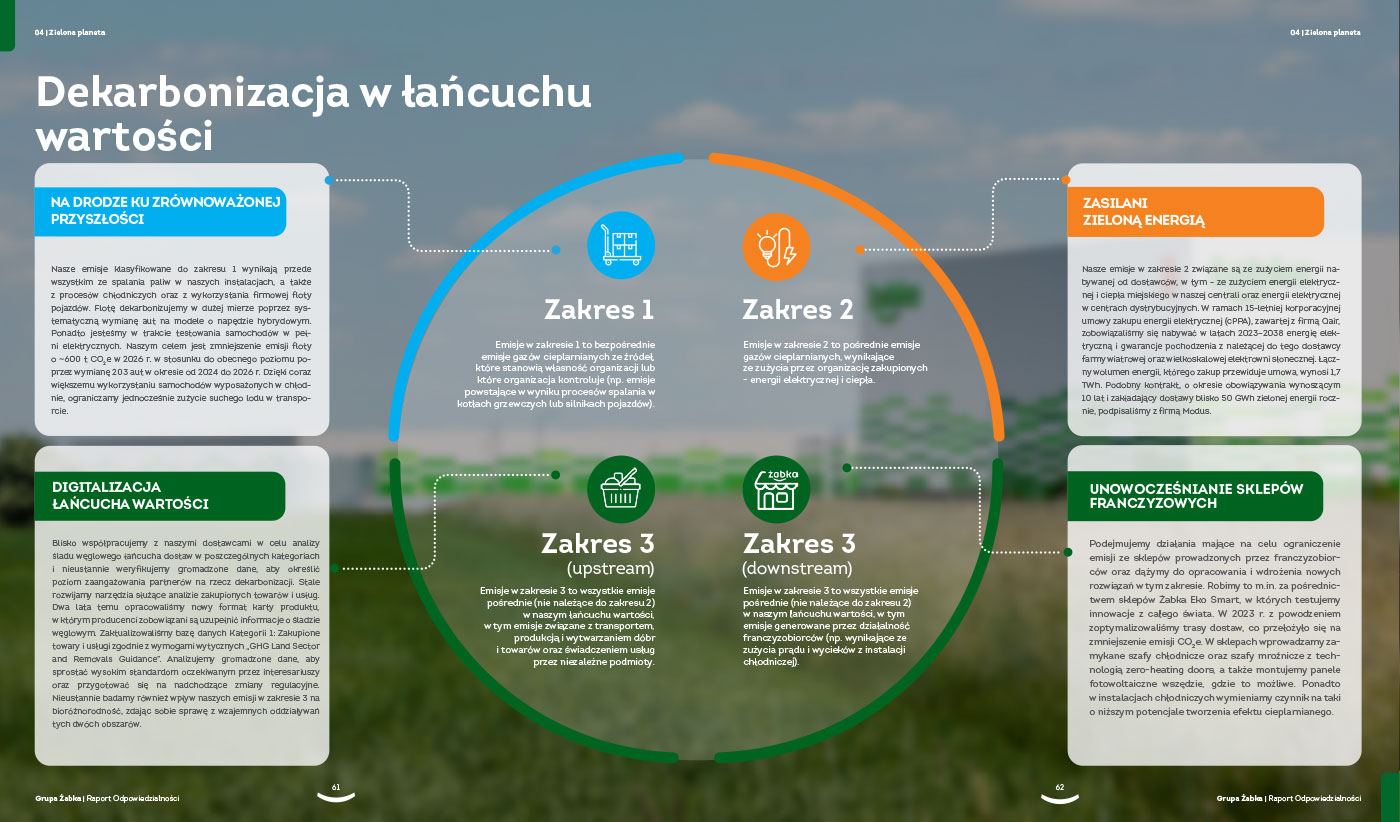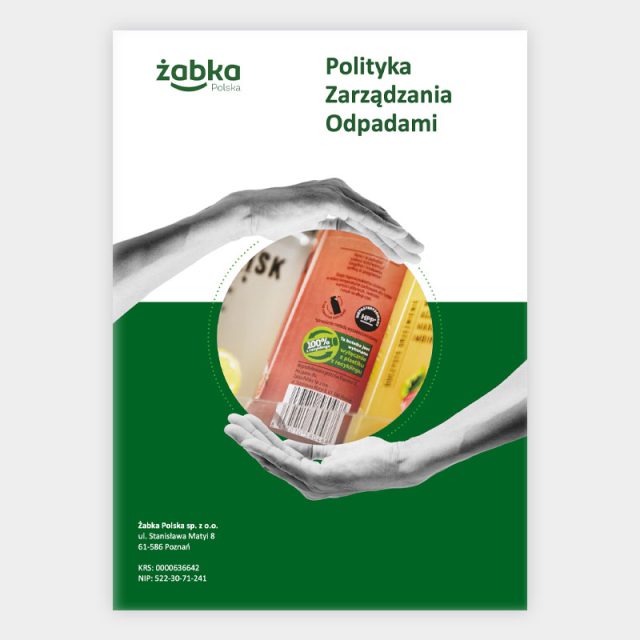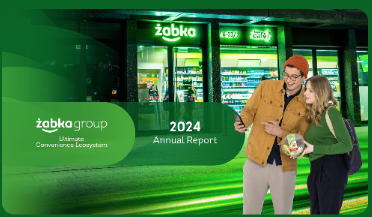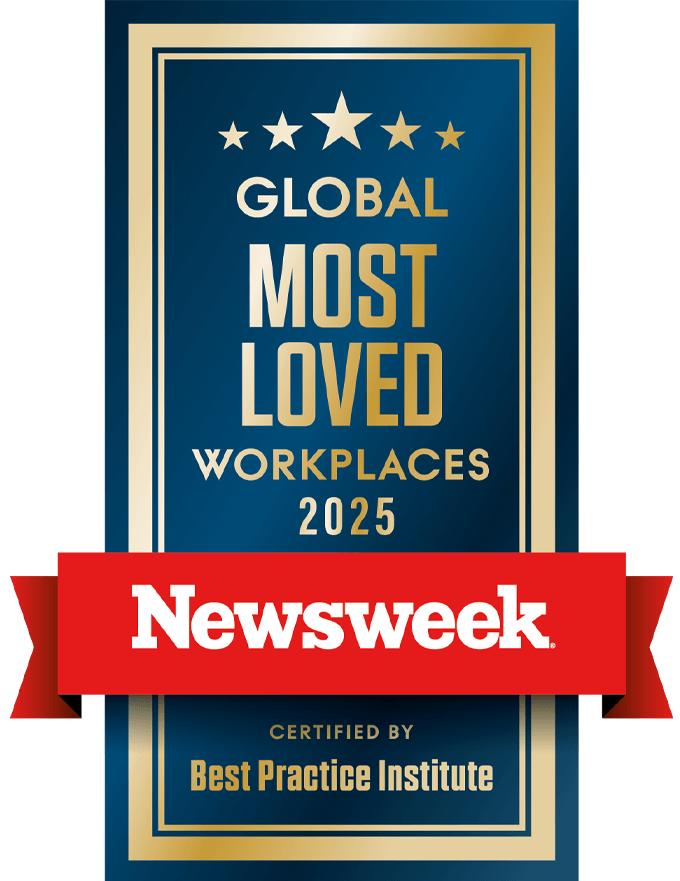Nasze podejście
Bioróżnorodność
Aby zapewnić kolejnym pokoleniom możliwość korzystania z bogactw przyrody, musimy zadbać o zachowanie różnorodności biologicznej jako naszego wspólnego dziedzictwa. Jesteśmy też świadomi wzajemnych powiązań między procesami destabilizacji środowiska naturalnego – jego ekosystemów – a zachodzącymi zmianami klimatu.
Chcąc aktywnie uczestniczyć w realizacji globalnych celów w zakresie ochrony zasobów naturalnych, w 2023 roku przyjęliśmy Politykę Bioróżnorodności. Polityka ta określa ogólne zasady zapobiegania utracie bioróżnorodności, a także główne kierunki działań podejmowanych w tym obszarze. Koncentruje się ona na ochronie ekosystemów, między innymi poprzez przeciwdziałanie wylesianiu. Przyjęta polityka obowiązuje spółkę Żabka Polska, jej franczyzobiorców oraz dostawców produktów marek własnych.
W ramach naszego zaangażowania na rzecz ochrony bioróżnorodności przyjrzeliśmy się łańcuchowi dostaw Żabki Polska oraz surowcom, których pozyskiwanie może przyczyniać się do wylesiania oraz do innych negatywnych wpływów na ekosystemy lądowe i morskie. Wprowadziliśmy zasady dotyczące zrównoważonego pozyskiwania wrażliwych surowców roślinnych wykorzystywanych w produkcji artykułów marek własnych, takich jak kawa, kakao, herbata, soja, a także ryby i owoce morza. Wszystkie wymienione grupy surowców muszą posiadać certyfikaty zrównoważonego pozyskiwania, uzyskiwane na drodze certyfikacji przez niezależne i międzynarodowo uznane instytucje certyfikujące.
Ponadto, w produktach marki własnej nie stosujemy oleju palmowego, natomiast od 2023 roku do sprzedaży w naszej sieci dopuszczamy produkty dostawców brandowych zawierające olej palmowy tylko w sytuacji, gdy posiada on certyfikat zrównoważonego pozyskiwania. Wymogi certyfikacji zrównoważonego pochodzenia dla surowców wrażliwych przyczyniają się w pierwszej kolejności do minimalizacji negatywnego wpływu na ekosystemy leśne na całym świecie, stanowiące naturalne habitaty dla wielu gatunków roślin i zwierząt.
Pogłębieniem działań minimalizujących negatywny wpływ na stan globalnego zalesienia jest przygotowanie Żabki Polska do realizacji obowiązków wynikających z rozporządzenia EUDR. To dla nas fundament do dalszych działań w obszarze przeciwdziałania degradacji lasów oraz ich wylesianiu. Na tej bazie będziemy rozwijać rozwiązania na rzecz zrównoważonego zarządzania surowcami w produktach marek własnych i brandowych.
Kolejnym istotnym dla nas wymiarem zrównoważonego wykorzystania rezerw naturalnych jest ochrona zasobów wodnych. Dostępność wody to jeden z kluczowych czynników kształtujących strukturę i odporność naturalnych ekosystemów na całym świecie. Realizujemy Politykę Wodną, która określa zasady ograniczenia zużycia wody oraz ochrony zasobów wodnych przed zanieczyszczeniami. Rozpatrujemy to w wymiarze operacyjnym, skupiając się na efektywnym gospodarowaniu wodą w działalności własnej, jak i w wymiarze produkcyjnym, związanym ze zużyciem wodny w łańcuchach dostaw. Dążymy w ten sposób do globalnej ochrony stanu zasobów wód powierzchniowych i podziemnych (jednolitych części wód).
W 2024 r. przeprowadziliśmy również analizę lokalizacji naszych inwestycji pod kątem zajmowania przez nie obszarów o zasadniczym znaczeniu dla bioróżnorodności. W ocenie uwzględniono bezpośrednie i pośrednie otoczenie poszczególnych obiektów w odniesieniu do 5 kategorii: bliskość obszarów chronionych, bliskość obszarów Natura 2000 (chroniących gatunki i siedliska), hydrologia, pokrycie terenu oraz zanieczyszczenie hałasem i światłem. Żadna z lokalizacji poddanych ocenie nie miała znaczącego wpływu na bioróżnorodność.
Nasze polityki w tym filarze:

Polityka dekarbonizacji wyznacza ogólne kierunki działań, zmierzające do realizacji celów klimatycznych opisanych w naszej Strategii Odpowiedzialności. Niniejsza Polityka jest także odpowiedzią na zobowiązania wynikające z udziału Żabka w inicjatywach na rzecz przeciwdziałania zmianom klimatu.

Polityka Energetyczna wskazuje kierunek działań dążących do wzrostu efektywności energetycznej oraz zwiększenia udziału odnawialnych źródeł energii, zarówno w operacjach własnych Żabka (zakres 2) jak i w łańcuchu wartości (zakres 3).

Polityka mobilności stanowi zbiór zasad i dobrych praktyk w odniesieniu do przemieszczania się w ramach wykonywania obowiązków zawodowych Pracowników i Współpracowników Żabka Polska. Jej celem jest ułatwienie podejmowania decyzji zarządczych w zakresie mobilności i środków transportu w sposób świadomy i bardziej przyjazny środowisku.

Polityka Transportowa określa ogólne zasady transportu towarów w Żabka Polska, zgodne z odpowiedzialnością środowiskową i ma zastosowanie do obecnych i przyszłych Partnerów Biznesowych odpowiedzialnych za przewóz towarów. Zgodnie z Polityką przy rozwoju infrastruktury logistycznej, planowaniu dostaw oraz kontraktowaniu floty poszukiwane powinny być rozwiązania niskoemisyjne oraz minimalizujące negatywny wpływ na środowisko.
Wybrane działania

Zaangażowanie w kompleksowe badania nad podejściem do zmian klimatu

Zaangażowanie w kompleksowe badania nad podejściem do zmian klimatu
Żabka Group jest jednym z głównych patronów czwartej edycji Humans Attack!, badania przeprowadzonego przez agencję Lata Dwudzieste i Kantar Polska na temat postaw Polaków wobec problemu zmian klimatycznych.
Premiera pierwszej edycja raportu, opublikowanej w 2019 roku, zbiegła się w czasie z ruchem Młodzieżowego Strajku Klimatycznego, w którym młodzi ludzie protestowali, domagając się działań na rzecz ochrony klimatu i zapobieżenia wzrostowi globalnych temperatur o więcej niż 1,5ᵒC. Postawy wynikające z tych działań znalazły również odzwierciedlenie w edycji z 2020 roku, która pokazała, że 78% respondentów obawia się wpływu zmian klimatycznych.
Najnowsze badania pokazują jednak trend malejący dla tego wskaźnika. 63% to nadal znaczący odsetek ankietowanych, ale mimo to duży spadek. Twórcy raportu stawiają więc pytanie: „Czy pięć fal pandemii, wybuch wojny za granicą i kryzys energetyczny znieczuliły Polaków na problemy Ziemi?”
Utrzymywanie zmian klimatycznych w centrum uwagi
W Żabce, zgodnie z naszymi działaniami na rzecz dekarbonizacji, gospodarki o obiegu zamkniętym i tworzenia wartości w sposób zrównoważony, jesteśmy zaangażowani w badanie postaw i wpływu zmian klimatu na społeczeństwo.
W swoim artykule do raportu zatytułowanym Zrównoważone zakupy – czas na pozbycie się złych nawyków, Sustainability Director Grupy Żabka, Rafał Rudzki, przeanalizował, jakie rozwiązania ekosystemu Żabki sprzyjają porzuceniu tytułowych złych nawyków w zakresie zakupów żywności. Według Rafała, współpraca w ramach “Ziemianie Atakują!” świetnie wpisuje się w działania podejmowane przez Grupę: „Grupa Żabka promuje zrównoważony styl życia i ułatwia prowadzenie go na co dzień. Badamy trendy, dzielimy się wiedzą i wprowadzamy odpowiedzialne rozwiązania. Wsparcie tej inicjatywy sprzyja debacie publicznej i długoterminowemu, zrównoważonemu rozwojowi gospodarczemu i społecznemu z troską o środowisko.”
Również w raporcie, w artykule zatytułowanym Jak zmieniają się kryteria wyboru produktów spożywczych wraz ze wzrostem świadomości zmian klimatycznych, nasz Brand & Innovation Director, Jan Kisielewski, opisał, jak konsumenci zachowują się w obliczu rosnących zagrożeń związanych z globalnym ociepleniem.
Jak podkreśla Jan: „W budowaniu skutecznej strategii prokonsumenckiej kluczowe jest dla nas śledzenie trendów, dlatego decyzja o patronacie nad raportem “Ziemianie Atakują!” była dla nas oczywista. Współpraca ta daje nam szeroką perspektywę na podejście Polaków do kwestii zmian klimatycznych oraz ich gotowości do adaptacji stylu życia i konsumpcji. Jesteśmy dumni, że możemy wspierać badania w tak ważnym dziś obszarze by skuteczniej wspierać naszych klientów w zmianie ich codziennych nawyków na lepsze.”

Żabka we współpracy z UNEP/GRID-Warszawa chroni wody Bałtyku

Żabka we współpracy z UNEP/GRID-Warszawa chroni wody Bałtyku
W Żabce mamy świadomość, że bioróżnorodność należy do kluczowych elementów zapewniających optymalne warunki do funkcjonowania człowieka oraz działań gospodarczych. Różnorodność biologiczna stanowi nasze dziedzictwo, a jej zachowanie jest warunkiem zapewnienia dostępu do bogactwa przyrody dla przyszłych pokoleń, dlatego podejmujemy kolejne kroki by wspierać jej ochronę.
By działać skutecznie w obszarze ochrony bioróżnorodności zdecydowaliśmy się dołączyć do programu Re:Generacja, który stanowi odpowiedź UNEP/GRID-Warszawa, ośrodka afiliowanego przy Programie Organizacji Narodów Zjednoczonych ds. Środowiska, na ogłoszenie przez ONZ lat 2021–2030 Dekadą Odtwarzania Ekosystemów.
W ramach tej współpracy, dzięki wsparciu Fundacji Mare we wrześniu 2024 roku zwodowaliśmy w porcie w Dziwnowie ufundowany przez Grupę Żabka kosz morski, który przez najbliższe dwa lata będzie oczyszczać wody Morza Bałtyckiego ze śmieci, wspomagając tym samym utrzymanie bioróżnorodności morskiego ekosystemu. Montaż kosza pozwala na odłowienie odpadów (w tym jednorazowych z tworzyw sztucznych) z basenu portowego zanim te trafią na dno morza, gdzie uległyby rozpadowi, zanieczyszczając wody i stwarzając zagrożenie dla morskich organizmów. Ograniczanie w ten sposób jednego ze źródeł negatywnej presji człowieka na ekosystem morski w korzystny sposób wpływa nie tylko na czystość wód, ale także wzmacnia odporność całego środowiska przyrodniczego Bałtyku.
Jak podkreśla Marta Urbaniak, Dyrektorka Działu Zarządzania Jakością i Środowiskiem w Żabce, “Cieszymy się, że wraz z UNEP/GRID-Warszawa oraz z Fundacją Mare możemy wspierać działania na rzecz ochrony cennego dla nas wszystkich ekosystemu Morza Bałtyckiego. Liczymy, że montaż kosza morskiego w Dziwnowie, będzie elementem zwiększającym świadomość ekologiczną na temat tego, jak we właściwy sposób postępować z odpadami pokonsumenckimi, a z drugiej strony – jak ważnym jest podejmowanie działań wobec obecnych wyzwań związanych z degradacją naturalnych ekosystemów.”
30-litrowy pojemnik wykonano z pochodzącego z recyklingu polietylenu, co sprawia, że jest on bardzo odporny na uszkodzenia i warunki atmosferyczne. Kosz jest w stanie w ciągu roku zebrać do 1,4 tony odpadów, a przy tym nie stanowi zagrożenia dla organizmów morskich – dwucentymetrowe otwory pozwalają na swobodne wpływanie i wypływanie z jego wnętrza małych ryb i krewetek.
Celem programu Re:Generacja jest pomoc w odbudowie zniszczonych ekosystemów, ale także ochrona tych, które są nadal w dobrym stanie. W ramach ogólnopolskiej inicjatywy do współpracy zapraszane są instytucje związane z ochroną przyrody, ale także reprezentanci biznesu, samorządów czy lokalnych organizacji pozarządowych.
Więcej na temat inicjatywy: link.

Droga ku przyszłości
Droga ku przyszłości
Jednym z priorytetów Grupy Żabka jest ograniczenie emisji związanej z eksploatacją firmowej floty pojazdów. W tym celu podejmujemy szereg różnych działań. Obecnie dysponujemy 900 samochodami hybrydowymi i 300 z napędem hybrydowym typu plugin, a w ciągu najbliższych dwóch lat planujemy wymieć kolejnych ponad 200 aut na bardziej ekologiczne, a także rozbudować infrastrukturę ładującą na terenie należących do Grupy obiektów oraz zainstalować ładowarki w domach pracowników.
Staramy się również pozytywnie wpływać na nawyki kierowców, między innymi za pośrednictwem za pośrednictwem programów takich jak „Ambasadorzy Elektromobilności” czy „Drive the Future”. Ten drugi motywuje do bezpieczniejszej i bardziej ekologicznej jazdy poprzez zbieranie i prezentowanie informacji o stylu prowadzenia auta przez różnych kierowców.
W programie wykorzystywana jest aplikacja Cartrack, która analizuje średnie spalanie, prędkość i dynamikę jazdy, aby zaklasyfikować technikę jazdy danego kierowcy jako bezpieczną bądź nie, akceptowalną lub nieakceptowalną. Ponadto aplikacja umożliwia porównywanie kierowców, tworząc ranking ich stylów jazdy. Osoby, które uplasują się najwyżej w tym zestawieniu, mogą liczyć na tytuł Mistrza Eko-jazdy, w programie można też wygrać atrakcyjne nagrody. Dzięki stworzeniu warunków do koleżeńskiej rywalizacji inicjatywa ta przyczynia się do realnej zmiany zachowań na drodze na lepsze.

Napędzani do tworzenia czystszej przyszłości

Napędzani do tworzenia czystszej przyszłości
Dla organizacji o skali i zasięgu Grupy Żabka, ciągłe modernizowanie i dekarbonizacja floty pojazdów jest kluczowym aspektem minimalizowania naszego wpływu na środowisko.
Dlatego w 2024 roku upewniliśmy się, że w żaden sposób nie zwolniliśmy naszych wysiłków na rzecz redukcji śladu węglowego, utrzymując koncentrację na własnej flocie pojazdów naszej najbardziej dojrzałej jednostki - Żabka Polska. Obejmowało to kontynuację programu elektryfikacji poprzez bieżącą wymianę silników diesla i benzynowych na odpowiedniki zasilane bateriami, hybrydy plug-in i pełne hybrydy. W rezultacie, do końca roku naszą flotę składało się 30 pojazdów elektrycznych, 900 pełnych hybryd i 300 hybryd plug-in. Co więcej, wszystkie nasze pojazdy elektryczne są prowadzone przez naszych 'Ambasadorów Elektromobilności', wybraną grupę pracowników, którzy po specjalnym szkoleniu jako pierwsi w organizacji przeszli na samochody elektryczne. Ich zadaniem jest promowanie elektromobilności i zachęcanie innych pracowników do korzystania z pojazdów niskoemisyjnych.
To nie wszystko. Zainstalowaliśmy również więcej ładowarek do pojazdów elektrycznych tam, gdzie są najbardziej przydatne – w naszych centrach logistycznych, naszej centrali, a nawet w domach naszych pracowników.
W 2024 roku wprowadziliśmy również 'Podwózkę', naszą dedykowaną aplikację do carsharingu dla pracowników. Umożliwia ona naszym pracownikom oferowanie innym wspólnej podróży podczas planowania wyjazdu służbowego, aby mogli podróżować zgodnie z naszą Polityką Mobilności, w przyjemnym towarzystwie i z korzyścią dla środowiska. Kontynuowaliśmy również nasz wyjątkowo udany program 'Drive the Future', uruchomiony w 2023 roku, który dostarcza wgląd w style jazdy i nawyki naszych pracowników, co pozwala nam pomagać im jeździć bezpieczniej i z mniejszym wpływem na środowisko.
Rywalizacja o bycie najlepszym
Ta wysoce efektywna inicjatywa wykorzystuje moduł GPS Cartrack, najpierw do analizy kilku aspektów zachowania kierowców, a następnie do klasyfikacji pracowników według ich wyników w zakresie bezpieczeństwa i efektywności. To stworzyło prawdziwą rywalizację wśród naszych pracowników o bycie najlepszym, co zaowocowało znacznymi poprawami jakości jazdy w całej organizacji.
Oczywiście, nasza praca nad tworzeniem i eksploatacją floty pojazdów niskoemisyjnych nie ogranicza się do naszej największej spółki, Żabka Polska. Lite e-Commerce rozwija i obsługuje naszą ekspresową usługę dostawy artykułów spożywczych q-commerce (obsługiwaną przez aplikację Żabka Jush) oraz działalność e-commerce (dostępną przez aplikację Żabka Jush i naszą stronę www.delio.com.pl).
Niskoemisyjna flota działającej w ramach Lite e-Commerce, to 82 elektryczne skutery używane przez naszych dostawców. Flota zawiera również 64 rowery, co zapewnia, że zawsze możemy realizować szybkie lokalne dostawy w najbardziej przyjazny dla środowiska sposób.
Według Joanny Kasowskiej, Quality Standards & Climate Protection Director Grupy Żabka, "Poszukiwanie ciągłego doskonalenia nigdy się nie kończy. Stale patrzymy w przyszłość, szukając nowych technologii, analizując ich wpływ na organizację, ludzi i środowisko, aby budować lepszy biznes zarówno z perspektywy kosztów, jak i środowiska. To kluczowy obszar naszej działalności."

Cyfrowa rewolucja w zarządzaniu danymi ESG

Cyfrowa rewolucja w zarządzaniu danymi ESG
W 2023 r. z entuzjazmem przystąpiliśmy do dalszej cyfrowej transformacji sprawozdawczości ESG w Grupie Żabka.
Naszym celem od dawna było stworzenie przejrzystego i prostego systemu do zbierania, udostępniania, prezentowania i analizowania danych w tym obszarze. Aby go osiągnąć, wdrożyliśmy odpowiednie rozwiązanie, umożliwiające kompleksowe zarządzanie wszelkimi danymi dotyczącymi śladu węglowego naszej organizacji.
System ten to spersonalizowane narzędzie, które łączy wysoce zaawansowane oprogramowanie Microsoft Sustainability Manager z autorską aplikacją do agregowania danych oraz modułem Power BI do niestandardowej sprawozdawczości. Dzięki skutecznej integracji tych elementów powstała platforma, która spełnia wszystkie nasze wymogi w zakresie umożliwienia pogłębionej analizy, lepszego rozumienia i dokładniejszej sprawozdawczości kwestii związanych z dekarbonizacją naszej działalności.
Nowa jakość sprawozdawczości
Według Katarzyny Wanat-Lipowskiej, Head of Decarbonisation, „dzięki wdrożeniu MSM z dnia na dzień podnieśliśmy jakość sprawozdawczości w zakresie dekarbonizacji w całej Grupie Żabka do zupełnie nowego poziomu. Co najważniejsze, mając tak szczegółowy i łatwo dostępny podgląd wszystkich istotnych danych, możemy z łatwością identyfikować wszelkie obszary wymagające uwagi. Umożliwia nam to szybką i skuteczną reakcję na każdy zaobserwowany wzrost emisji. Co więcej, wszyscy członkowie Zespołu ds. Dekarbonizacji mają dostęp do czytelnych paneli kontrolnych, które pozwalają im monitorować zmiany poziomów emisji, jak i zobaczyć własny wpływ na wdrażanie strategii dekarbonizacji Grupy Żabka”. Ponadto, jak podkreśla Katarzyna Wanat-Lipowska, zaangażowanie, jakie w zespole wzbudziła realizowana inicjatywa, stanowi ogromną wartość: „Daje ono wszystkim poczucie odpowiedzialności za wdrażanie przyjętej Strategii Odpowiedzialności”.
Kompleksowy system
Grupa Żabka dysponuje obecnie kompleksowym system raportowania i monitorowania, w którym uczestniczą kluczowi interesariusze wewnętrzni. Jak wyjaśnia Katarzyna Wanat-Lipowska, zakres jego zastosowania wykracza poza wskazywanie ewentualnych problematycznych kwestii: „Pozwala nam on także zbierać informacje w sposób dokładniejszy i bardziej przejrzysty niż wcześniej, a tym samym śledzić postępy w zakresie dekarbonizacji za pomocą zindywidualizowanych narzędzi, takich jak autorska aplikacja ESG czy specjalne panele kontrolne. To istotny krok naprzód w naszej działalności”.
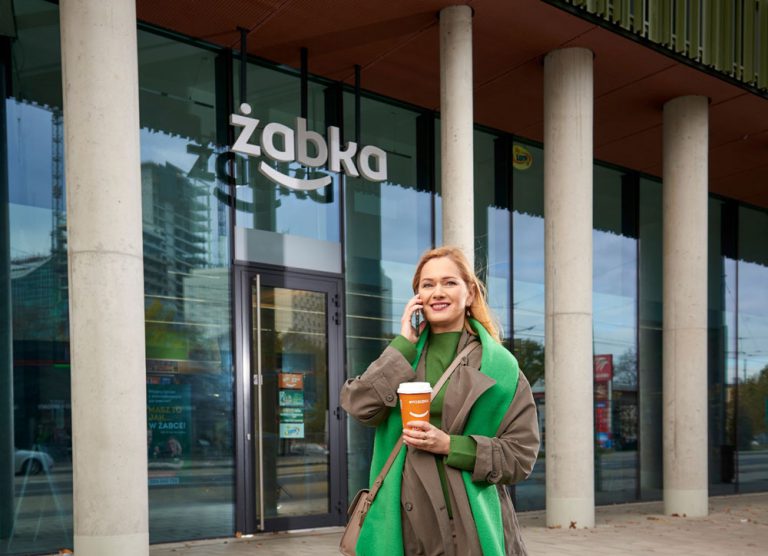
Kooperacja na rzecz innowacji - RELOOPED
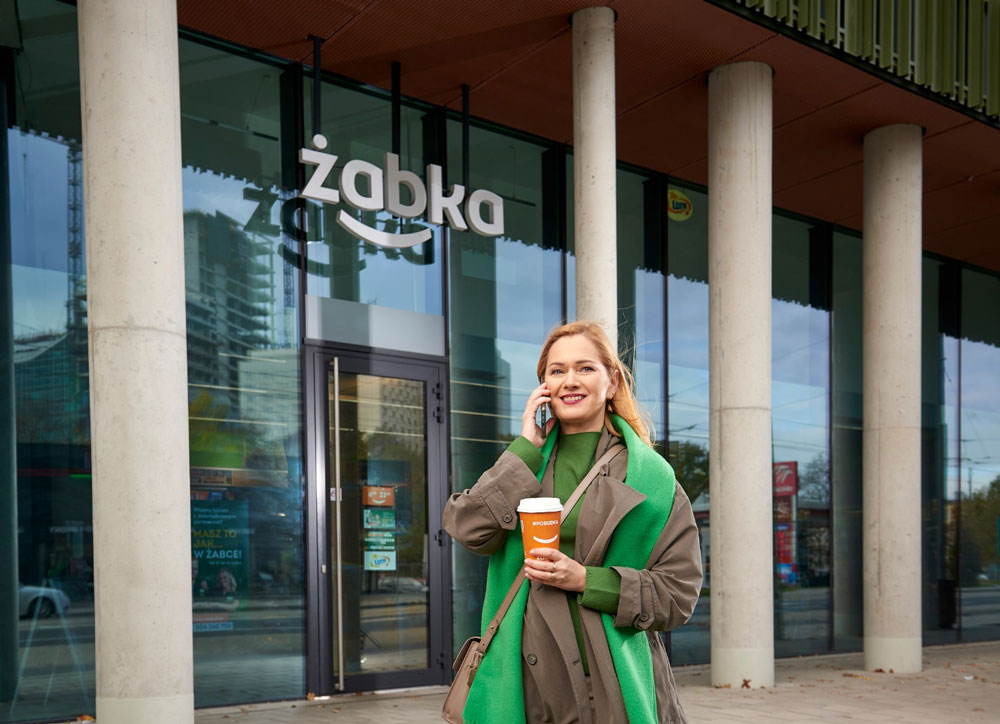
Kooperacja na rzecz innowacji - RELOOPED
W Żabce stale poszukujemy innowacji i technologii, które będą pozwalały tworzyć rozwiązania wygodne i odpowiedzialne. Z tego powodu z radością dołączyliśmy do szeroko zakrojonej współpracy, w której udział biorą nie tylko komercyjne przedsiębiorstwa, ale również instytucje naukowe. Naszym wspólnym celem jest wypracowanie innowacyjnych rozwiązań, które będą służyły zarówno naszym klientom, jak i planecie.
W ramach naszego zaangażowania w projekt RETAIL RELOOPED, zarządzany przez BOFA, aktywnie współpracujemy z partnerami z różnych sektorów - od handlu detalicznego, poprzez przemysł odpadowy, aż po naukę. Dążymy do stworzenia opakowań do żywności, które będą nie tylko funkcjonalne, ale także przyjazne dla środowiska.
Ta międzynarodowa inicjatywa, wspierana funduszami z unijnego programu Interreg South Baltic, pozwala nam na aktywne działanie na rzecz opracowania nowych, zrównoważonych rozwiązań. Dzięki zaangażowaniu instytucji przemysłu odpadowego, świata nauki, ale też sieci handlu detalicznego, takich jak Żabka, możliwe jest przetestowanie innowacyjnych rozwiązań cyrkularnych na wielu płaszczyznach, również z aktywnym udziałem użytkowników. Jako partner wspierający, będziemy angażować naszych klientów w testowanie innowacyjnych opakowań w wybranych sklepach sieci, które pełnią rolę "living labs".
Nasze zaangażowanie w projekt RELOOPED nie tylko podkreśla naszą innowacyjność, ale przede wszystkim stanowi wyraz naszej odpowiedzialności - jednej z głównych wartości naszej firmy. Współpraca ta wpisuje się w Strategię Odpowiedzialności Żabki, a dokładnie w filar 04 Zielona planeta, który zakłada aktywne działanie na rzecz zrównoważonego rozwoju.
Jesteśmy dumni, że możemy być częścią tej inicjatywy, która przyczynia się do budowania zrównoważonej przyszłości. Wierzymy, że dzięki współpracy z innymi przedsiębiorstwami i instytucjami naukowymi, możemy wspólnie wypracować rozwiązania, które będą dobre zarówno dla naszych klientów, jak i dla planety.

Zamykamy obieg w dwóch polskich miastach

Zamykamy obieg w dwóch polskich miastach
Jednym z kluczowych obszarów, na których Żabka koncentrowała się w 2023 r., było promowanie zasad gospodarki o obiegu zamkniętym wśród klientów, a ich bezpośrednie zaangażowanie w zbieranie opakowań nadających się do recyklingu stało się istotnym priorytetem działań podejmowanych w ramach filaru „Zielona Planeta” Strategii Odpowiedzialności Grupy Żabka.
Cel ten realizujemy przede wszystkim poprzez akcję „Zielona Odnowa”, którą pilotażowo przeprowadziliśmy w 2023 r. roku w Zielonej Górze i Bydgoszczy. Jej partnerem jest m.in. Urząd Miasta Bydgoszcz. W ramach inicjatywy klienci mogą zwracać do naszych sklepów butelki PET o pojemności do 2 l oraz aluminiowe puszki o pojemności do 1 l.
Nagroda za zwrot
Zgodnie z zasadami pilotażu programu każdy klient zwracający jednorazowe opakowanie po napoju otrzymuje żappsy lub zniżkę na kolejny napój w butelce PET lub puszce.
Jak mówi Krzysztof Jańczak, franczyzobiorca Żabki z Zielonej Góry: „Od zawsze temat ekologii, w tym segregacji odpadów, był dla mnie niezwykle ważny. Gdy usłyszałem o „Zielonej Odnowie”, bardzo się ucieszyłem, podobnie jak moi stali klienci. Już w pierwszych dniach odzew na inicjatywę był bardzo duży. Mam nadzieję, że ta pilotażowa akcja będzie dalej rozwijana i ulepszana”.
Zachęcamy również klientów do zwracania pustych plastikowych butelek i puszek po napojach do EKOmatów, czyli specjalnych urządzeń do zbiórki odpadów. Łącznie udostępniliśmy ich ponad 70. Znajdują się one na terenie wybranych sklepów Żabka lub w ich bezpośrednim otoczeniu. Poza Bydgoszczą i Zieloną Górą, w których to miastach w ramach pilotażowego wdrożenia akcji „Zielona Odnowa” opakowania można zwracać zarówno za pomocą przeznaczonych do tego urządzeń, jak i bezpośrednio u sprzedawcy, klienci mogą korzystać z EKOmatów także w Łodzi, Poznaniu i Warszawie.
Wzmacnianie świadomości ekologicznej
Joanna Kasowska, Dyrektorka ds. Jakości i Standardów Zarządzania Żywnością, nie kryje entuzjazmu związanego z pilotażem programu: „Odpowiedzialność jest jedną z kluczowych wartości wpisanych w DNA Grupy Żabka. Chcemy, aby nasze działania nie tylko upraszczały życie naszym klientom, ale też pozytywnie wpływały na interesariuszy naszej firmy, społeczność i środowisko naturalne. Istotnym aspektem pilotażu projektu „Zielona Odnowa” jest wzmacnianie świadomości ekologicznej konsumentów, poprzez zwiększenie prośrodowiskowych kompetencji w zakresie właściwego postępowania z odpadami opakowaniowymi oraz zrozumienia idei recyklingu jako kroku w kierunku gospodarki cyrkularnej”.

Korzyść dla środowiska i dla klientów z własnym kubkiem

Korzyść dla środowiska i dla klientów z własnym kubkiem
W sklepach Żabka od dawna, oprócz innych napojów gorących, serwujemy wyłącznie paloną we Włoszech kawę gatunku Arabica. Mając ponad 10 000 placówek, staliśmy się największą siecią kawiarni w Polsce, w której każdego roku sprzedaje się łącznie ok. 24 mln kubków kawy. To imponujące ilości.
Dlatego też w 2023 r., aby ograniczyć powstawanie związanych z tą działalnością odpadów i jednocześnie móc obniżyć ceny, wdrożyliśmy inicjatywę #Zielonykubekwielorazowy.
Bezpieczne, wielorazowe, zdatne do recyklingu...
W ramach inicjatywy oferujemy klientom możliwość nabycia za 49,99 PLN bezpiecznego i zdatnego do recyklingu wielorazowego kubka, który wykonany jest z naturalnych surowców, w tym drewna z certyfikatem FSC®. Przynosząc go lub inny wielorazowy kubek ze sobą do sklepu Żabka, klient otrzymuje zniżkę w wysokości 1 PLN na zamówiony gorący napój.
Jak mówi Joanna Kasowska, Dyrektorka ds. Jakości i Standardów Zarządzania Żywnością Grupy Żabka: „W ten sposób chcemy zachęcić naszych klientów do wspierania kultury ponownego wykorzystywania przedmiotów i ograniczenia użycia tych jednorazowych. To prosty sposób na aktywne uczestnictwo w walce z zanieczyszczeniem środowiska i promocję cyrkularnych rozwiązań. Wspierając takie inicjatywy, jako konsumenci, możemy także przyczynić się do zmiany zachowań oraz wzrostu świadomości związanej z ochroną środowiska naturalnego”.
Ochrona przyrody i zasobów naturalnych
Grupa Żabka dąży do tego, aby jej działalność związana ze sprzedażą kawy charakteryzowała się jak najbardziej pozytywnymi oddziaływaniami na środowisko. Oferowana przez nas kawa jest certyfikowana przez Rainforest Alliance, co oznacza, że zarówno nasza firma, jak i nasi klienci wspierają prawa i dobrostan rolników, jednocześnie przyczyniając się do ochrony przyrody i zasobów naturalnych. Dzięki nowej inicjatywie wspólnie zapobiegamy powstawaniu zbędnych odpadów w postaci tysięcy jednorazowych kubków. Naszym dotychczasowym rekordem jest sprzedaż 72 kubków kawy w ciągu jednej minuty, a zatem im więcej osób skorzysta z zaproponowanego rozwiązania, tym większy będzie jego pozytywny wpływ.

Elektromobilne wsparcie w redukcji śladu węglowego

Elektromobilne wsparcie w redukcji śladu węglowego
Istotnym zadaniem, jakie postawiliśmy sobie w ramach planu dekarbonizacji Grupy Żabka, jest ograniczenie emisji w całym naszym łańcuchu wartości. Zgodnie z tym założeniem od 2021 r. podejmujemy systematyczne działania w celu minimalizacji wpływu naszych pojazdów na środowisko.
W 2023 r. koncentrowaliśmy się w dużej mierze na umożliwieniu zmniejszenia emisji naszej floty o ok. 0,6 tys. t CO₂ do 2026 r. W kolejnym kroku planujemy wymianę 203 pojazdów w latach 2024–2026. Według Agnieszki Przybylskiej, Head of Indirect Procurement & Administration: „Podjęliśmy szereg istotnych działań w celu ograniczenia naszego śladu węglowego, szczególnie w miastach i regionach najbardziej narażonych na zanieczyszczenie powietrza”.
Wśród różnych inicjatyw realizowanych przez Grupę Żabka w tym obszarze na szczególną uwagę zasługuje wykorzystanie przez naszych sprzedawców terenowych, których codzienna praca wiąże się z częstą jazdą samochodem, 500 aut hybrydowych Toyota Yaris Cross. Stanowią one znaczną część naszej floty, która obejmuje 900 pojazdów hybrydowych i 300 hybryd typu plug-in.
Oczywiście kluczowym element każdego programu mającego na celu upowszechnienie korzystania z pojazdów elektrycznych jest zapewnienie odpowiedniej infrastruktury. Dlatego też Grupa Żabka zainwestowała we własne stacje ładowania w siedzibie w Poznaniu oraz w centrach logistycznych w Nadarzynie i Plewiskach. Co być może istotniejsze, ładowarki zainstalowaliśmy także w domach pracowników poruszających się autami elektrycznymi lub z napędem hybrydowym typu plug-in.
Dysponujemy również ponad 30 bezemisyjnymi, w pełni elektrycznymi samochodami, które udostępniamy pracownikom, którzy zdecydowali się przystąpić do uruchomionego w 2023 r. programu „Ambasadorzy Elektromobilności”. W jego ramach kierowcy testują powierzone im auta elektryczne i propagują ich zalety wśród swoich współpracowników. Anna Sobczyńska, Menadżerka ds. Strategii Marek i Konsumenta, wyjaśnia, w jaki sposób przystąpienie do programu wpłynęło na realizację jej codziennych obowiązków: „Odkąd dołączyłam do grona Ambasadorów Elektromobilności i przesiadłam się na samochód elektryczny, moje codzienne dojazdy do pracy stały się znacznie przyjemniejsze, przede wszystkim ze względu na dostępność bezpłatnych miejsc parkingowych, korzystanie z bus pasów i wygodę stacji ładowania na parkingu biurowym. Przesiadka do auta elektrycznego była zaskakująco łatwa dzięki szkoleniom organizowanym przez dział administracji, a także społeczności ambasadorów, którzy chętnie dzielą się doświadczeniami i dobrymi praktykami”. Jak podkreśla Anna: „Udział w programie ambasadorskim nie tylko zapewnia wygodę w codziennej podróży, ale również daje poczucie wyjątkowości oraz wyznaczania kierunku zmian na lepsze w organizacji.”
Michał Hodowany, Kierownik Działu Transportu, zaznacza z kolei, że pojazdy elektryczne nie są przeznaczone wyłącznie dla pracowników biurowych: „To już 11 auto służbowe w mojej karierze. Szacuję, że podczas wyjazdów służbowych przejechałem blisko 1,1 milionów km, jednak te 15 tysięcy km, które pokonałem autem elektrycznym jest wyjątkowe. Odkąd dołączyłem do Ambasadorów Elektromobilności, podróże służbowe stały się przyjemniejsze. Dzięki temu, że nie słyszę silnika w trakcie jazdy mogę cieszyć się ciszą, a planowanie ładowania i postojów przed wyjazdem w trasę sprawiło, że podróże przebiegają spokojniej.”
Każdy z ambasadorów przechodzi specjalne szkolenie, mające ułatwić przesiadkę na samochód elektryczny. Planujemy również wyznaczyć mentorów, którzy będą dzielić się swoją wiedzą w zakresie elektromobilności i swoim entuzjazmem zachęcać innych do korzystania z tego rozwiązania.
Omawiany program nie jest odosobnioną inicjatywą. Jak podkreśla Agnieszka Przybylska, „W ciągu ostatnich dwóch lat przeszkoliliśmy również ponad 700 osób w zakresie oszczędnej i bezpiecznej techniki jazdy samochodem”.

Franczyzobiorcy rywalizują w zakresie zmniejszenia zużycia energii i ograniczenia śladu węglowego

Franczyzobiorcy rywalizują w zakresie zmniejszenia zużycia energii i ograniczenia śladu węglowego
Dążąc do osiągnięcia ambitnych celów określonych w Strategii Odpowiedzialności Grupy Żabka, w 2023 r. kontynuowaliśmy realizację działań wskazanych w przyjętym Planie Dekarbonizacji.
Oczywiście, ze względu na charakter naszej działalności i strukturę naszej organizacji, zakres planu wykracza daleko poza nasze operacje własne i obejmuje sieć ponad 10 000 sklepów prowadzonych przez franczyzobiorców. Dysponując łańcuchem wartości o takiej skali, mamy wyjątkowy potencjał do wywierania znacznego pozytywnego wpływu na środowisko pod warunkiem, że wdrożymy właściwe inicjatywy w zakresie oszczędzania energii w wystarczającej liczbie punktów sprzedaży.
Mając powyższe na uwadze, 1 czerwca 2023 r. ogłosiliśmy konkurs wśród franczyzobiorców, aby przekonać się, o ile możemy wspólnie ograniczyć zużycie energii w stosunku do poziomu z 2022 r. w całej sieci sklepów Żabka.
Wydajne i skuteczne
Jak mówi Łukasz Kawka, Kierownik Działu Nowych Technologii i Rozwoju: „Uznaliśmy, że lato to najlepsza pora, by podjąć taką próbę – wielu klientów przychodzi do naszych sklepów tylko po to, aby kupić lody lub coś zimnego do picia. Oprócz pracy klimatyzacji w czasie upałów w tym okresie wzrasta również wykorzystanie urządzeń chłodniczych. Z związku z tym tak ważne jest zadbanie o to, by chłodziarki, zamrażarki i klimatyzatory były w dobrym stanie i pracowały jak najwydajniej i jak najskuteczniej, a drzwi wejściowe do sklepów nie były pozostawiane otwarte”.
Poprosiliśmy franczyzobiorców, aby zobowiązali się do zużycia co najmniej 10% mniej energii elektrycznej niż w okresie od 1 czerwca do 31 sierpnia 2022 r. Aby ich do tego zmotywować, zaoferowaliśmy szereg nagród, w tym nagrody pieniężne i atrakcyjne usługi lub elementy wyposażenia sklepu, takie jak elektroniczne etykiety cenowe, nowy piekarnik Merrychef, nowy ekspres do kawy czy usługę dogłębnego czyszczenia lokalu.
Franczyzobiorcy podejmują wyzwanie
Powyższe zachęty, w połączeniu z poczuciem rywalizacji i chęcią obniżenia zużycia energii, przekonały franczyzobiorców prowadzących łącznie prawie 3 000 sklepów do udziału w konkursie. Przekazaliśmy im wskazówki, jak osiągnąć największe oszczędności za pomocą kilku prostych działań, takich jak ustawienie klimatyzacji na 23 stopnie, dopilnowywanie zamykania drzwi wejściowych w dni, w które temperatura powietrza wynosi 27 stopni lub więcej, zapewnienie przepływu powietrza wokół zamrażarek i chłodziarek czy regularne czyszczenie kratek wentylacyjnych.
Ogólnie zaproponowana inicjatywa okazała się bardzo udana, pozwalając w ciągu trzech miesięcy zaoszczędzić blisko 1,9 GWh energii. W uznaniu podjętych starań nagrodziliśmy 126 franczyzobiorców, którzy uzyskali najlepsze wyniki. Drugą edycję konkursu przeprowadziliśmy między listopadem a grudniem, osiągając kolejne oszczędności. Łącznie w obu edycjach ograniczyliśmy zużycie energii o ponad 2,7 GWh, co pozwoliło na uniknięcie emisji 1 957,56 t CO2 w zakresie 3.

Mały gest, wielki efekt

Mały gest, wielki efekt
Warto wiedzieć, że szklana butelka zwrotna może być używana przeciętnie od 15 do 26 razy, co oznacza znacznie mniejszą emisję dwutlenku węgla w trakcie jej cyklu życia, w porównaniu z butelką bezzwrotną.
Dlatego latem 2022 r. Żabka przeprowadziła kampanię edukacyjną zachęcającą klientów do oddawania pustych butelek zwrotnych po piwie. Za każdą oddaną butelkę klient otrzymywał 0,50 PLN zniżki na pełną butelkę, przy czym w ramach jednej transakcji można było wymienić do 20 butelek. W efekcie odnotowaliśmy wzrost zwrotów o ok. 10 p.p. r/r.
To bardzo dobra wiadomość, gdyż nawet niewielkie zwiększenie skali ponownego wykorzystania butelek szklanych przynosi bardzo pozytywne rezultaty. Według Związku Pracodawców Przemysłu Piwowarskiego – Browary Polskie, do wyprodukowania jednej tony szkła zużywa się przeciętnie 800 kg piasku, 280 kg wapnia, 230 kg sody i 30 kg barwników. Ponadto do wytworzenia jednej butelki potrzeba średnio 1,1 MW energii. Ponieważ Żabkę odwiedzają codziennie miliony klientów w całej Polsce, jesteśmy w stanie wywierać znaczący wpływ na nawyki konsumenckie w wielu obszarach. Akcja ta pokazuje, jak istotne dla środowiska mogą być nawet drobne gesty, o ile wykonuje się je na wielką skalę.

Drugie życie opakowań

Drugie życie opakowań
W ramach pilotażowej kampanii „Zielona Odnowa”, realizowanej we współpracy z Urzędem Miasta Bydgoszczy, nasi klienci mogą zwracać jednorazowe opakowania plastikowe i aluminiowe po napojach do ponad 120 sklepów Żabka w całym mieście. Zebrane surowce będą wykorzystywane do wytworzenia nowych opakowań, dzięki czemu mniej odpadów trafi na wysypiska. Celem akcji jest również budowanie świadomości ekologicznej wśród klientów i wyrobienie nawyku zwracania plastikowych i aluminiowych opakowań po napojach. Wśród jej innych zalet należy wymienić także bliskość sklepów, czyli punktów odbioru, łatwy i szybki proces zwrotu, a także nagrodę dla klientów za proekologiczną postawę – za każdą zwróconą plastikową butelkę lub aluminiową puszkę otrzymują oni 50 żappsów. Istnieją dwa sposoby zwrotu – za pomocą butelkomatów, czyli specjalnych automatów do selektywnej zbiórki odpadów, lub bezpośrednio u sprzedawcy, który naliczy odpowiednią liczbę żappsów.

Rozwijamy pilotaż elektrycznej floty

Rozwijamy pilotaż elektrycznej floty
Program pilotażowy zakupu samochodów ciężarowych realizujemy w ramach partnerstwa z dwoma podmiotami. Od 2019 roku testujemy zeroemisyjne pojazdy dostawcze we współpracy z Grupą Volkswagen. Korzystamy z czterech elektrycznych transporterów ABT i dwóch e-Crafterów. Zainwestowaliśmy także we własne stacje ładowania aut elektrycznych w centrach logistycznych w Nadarzynie oraz Plewiskach oraz w centrali. W 2021 roku rozpoczęliśmy współpracę z Volvo Polska, w ramach której testujemy zeroemisyjny pojazd Volvo FL Electric z zabudową chłodniczą, który dostarcza towar do sklepów na Śląsku. To pierwszy w Polsce w pełni elektryczny samochód dystrybucyjny zaprojektowany m.in. z myślą o pracy w mieście. Stopniowo modernizujemy również naszą flotę samochodów osobowych i prowadzimy testy mające na celu zastąpienie aut spalinowych pojazdami elektrycznymi i hybrydowymi. Nowe, elektryczne i hybrydowe samochody redukują emisję gazów cieplarnianych i poziom hałasu, dzięki czemu mogą być z powodzeniem użytkowane w strefach czystego transportu.

Obniżamy emisje w łańcuchu dostaw

Obniżamy emisje w łańcuchu dostaw
Za blisko 68% śladu węglowego w zakresie 3 odpowiadają nasi dostawcy towarów i usług, dlatego angażujemy partnerów biznesowych z różnych branż w poszukiwanie innowacyjnych rozwiązań redukujących emisje w łańcuchu wartości. Przykładem jest współpraca z neutralnym emisyjnie przedsiębiorstwem Goodvalley, którego produkty posiadają zerowy ślad węglowy oraz Grupą Żywiec, która w procesach produkcyjnych wykorzystuje jedynie energię elektryczną pochodzącą z odnawialnych źródeł. Możliwości redukcji emisji poszukujemy również w ramach wygodnych usług – obniżamy emisje poprzez usługę odbioru paczki w punkcie, którą realizujemy we współpracy z InPost oraz innymi operatorami logistycznymi w Polsce – dostarczenie paczki do Żabki generuje mniejszy ślad węglowy niż dostarczenie jej bezpośrednio pod wskazany adres. Ułatwiając świadome wybory żywieniowe rozszerzamy również ofertę produktów roślinnych będących doskonałą alternatywą dla produktów odzwierzęcych – wprowadziliśmy artykuły takich marek jak Garden Gourmet, Dobra Kaloria czy Alpro. W 2021 roku stworzyliśmy także w 100% roślinną markę własną Plant Hunter.

Ograniczenie emisji w operacjach własnych

Ograniczenie emisji w operacjach własnych
Do redukcji emisji CO2 podchodzimy w sposób kompleksowy. W 2022 r. skoncentrowaliśmy nasze działania na obniżeniu emisji generowanych przez naszą flotę pojazdów oraz poprawie efektywności energetycznej.
Dekarbonizacja floty, która liczy ok. 1 600 samochodów, obejmowała m.in. wprowadzenie do użytku 500 nowych hybrydowych Toyot Yaris Cross. Jeżdżą nimi przedstawiciele kadry terenowej, którzy ze względu na charakter swojej pracy zużywają istotne ilości paliwa. Ponadto zainwestowaliśmy we własne stacje ładowania aut elektrycznych w siedzibie w Poznaniu oraz w centrach logistycznych w Nadarzynie i Plewiskach, oferując tym samym wsparcie pracownikom korzystającym z aut hybrydowych i elektrycznych. Zorganizowaliśmy także konkurs dla franczyzobiorców i pracowników na pomysły poprawiające efektywność energetyczną. Otrzymaliśmy 999 zgłoszeń, które dotyczyły głównie wyposażenia, oświetlenia i ogrzewania. Rozpoczęliśmy również budowę dwóch instalacji fotowoltaicznych w centrach dystrybucyjnych w Gliwicach i Radzyminie. Kolejny rok z rzędu 100% energii zużytej przez nas w operacjach własnych pochodziło ze źródeł odnawialnych.

Minimalizacja wpływu na środowisko w łańcuchu wartości

Minimalizacja wpływu na środowisko w łańcuchu wartości
W 2022 r. wprowadziliśmy pierwszy neutralny klimatycznie produkt marki własnej – wodę Od Nowa. Obliczając jej ślad węglowy, określiliśmy dokładnie wielkość emisji powstających przez cały jej cykl życia. Następnie ograniczyliśmy ten ślad do minimum, wykorzystując butelki pochodzące z recyklingu, a także zapewniając energię ze źródeł odnawialnych w połowie sklepów Żabka. Pozostałą emisję gazów cieplarnianych, powstających w cyklu życia wody Od Nowa, zneutralizowaliśmy poprzez zakup tzw. offsetów. Ważny jest dla nas nie tylko wpływ na środowisko sprzedawanego asortymentu, ale i samych sklepów. W 2022 r. Żabka otworzyła w Poznaniu pierwszą placówkę w formacie Eko Smart, laboratorium ekologicznych innowacji wspartych inteligentnymi rozwiązaniami, w tym panelami fotowoltaicznymi wytwarzającymi zieloną energię, innowacyjną instalacją perowskitową na ścianie oraz wydajniejszymi chłodziarkami z półkami glikolowymi. Dodatkowo cała ściana sklepu jest pokryta roślinnością, która wytwarza tlen i pochłania szkodliwe substancje. Klienci są również zachęcani do korzystania z butelkomatu – maszyny do zbiórki plastikowych butelek i puszek.

Przystąpiliśmy do Polskiego Paktu Plastikowego

Przystąpiliśmy do Polskiego Paktu Plastikowego
Pakt jest częścią światowej inicjatywy Plastics Pact Network Fundacji Ellen MacArthur. Globalnie bierze w niej udział ponad 400 firm odpowiedzialnych za wprowadzanie 20% opakowań na światowe rynki, interesariusze instytucjonalni, organizacje pozarządowe i branżowe, a także ośrodki naukowe i inwestorzy. Celem Polskiego Paktu Plastikowego jest zmiana obecnego modelu wykorzystywania tworzyw sztucznych w opakowaniach w kierunku gospodarki obiegu zamkniętego. Członkowie Paktu podejmują działania zmierzające do zwiększenia poziomu recyklingu i w efekcie – redukcji śladu węglowego. Zobowiązują się również do inicjowania projektów podnoszących świadomość konsumentów i przyczyniających się do zwiększenia poziomu poprawnej segregacji opakowań. Cele wyznaczone przez sygnatariuszy Paktu do 2025 roku wykraczają poza obowiązujące w Polsce przepisy prawa.

Wdrożyliśmy Politykę Cyrkularności

Wdrożyliśmy Politykę Cyrkularności
Pozwala ona włączyć naszych partnerów biznesowych w działania maksymalizujące nasz wpływ na zamknięcie obiegu plastiku w całym łańcuchu wartości. Polityka będzie stopniowo wdrażana we współpracy z wszystkimi partnerami biznesowymi. Opiera się ona o autorski model cyrkularności „Zielony obieg”, w którym zawarto wytyczne dotyczące odpowiedzialnego gospodarowania zasobami w siedmiu obszarach: ekoprojektowanie, tworzenie z poszanowaniem zasobów, zrównoważona dystrybucja, odpowiedzialna sprzedaż, świadoma konsumpcja, efektywna zbiórka oraz kompleksowy odzysk i regeneracja. Wyznaczyliśmy zestaw jasnych zasad, którymi kierujemy się w naszych dążeniach do cyrkularności, a odpowiedzialność rozciągamy na cały proces – od projektowania po zapewnienie drugiego życia i regenerację środowiska.

Opracowaliśmy Politykę Ekoprojektowania

Opracowaliśmy Politykę Ekoprojektowania
To drogowskaz pokazujący jasne zasady projektowania i doboru odpowiednich surowców dla opakowań Jej fundamentem są cztery zasady: zapętlaj, redukuj, upraszczaj i komunikuj. Redukujemy masy i objętości oraz promujemy opakowania wielokrotnego użytku. Przygotowując opakowania zwracamy i są preferowane w procesach recyklerskich. Upraszczamy formę, nadając opakowaniom optymalny kształt, aby umożliwić ich maksymalne opróżnienie. Poprzez system piktogramów umieszczonych na opakowaniach podpowiadamy konsumentom, do jakiej frakcji odpadów powinny one trafić po zużyciu nierozerwalnych etykiet wykonanych z innego niż samo opakowanie tworzywa, dzięki czemu poddanie go recyklingowi jest łatwiejsze.

Eliminujemy plastik i foliowe opakowania

Eliminujemy plastik i foliowe opakowania
Zastąpiliśmy plastikowe pokrywki na kubki z kawą oraz torby na zakupy odpowiednikami wykonanymi z papieru z certyfikatem FSC. Gwarantuje on m.in., że w miejsce każdego ściętego drzewa zostało nasadzone przynajmniej jedno nowe. Papier użyty do produkcji toreb i wieczek do kawy rozkłada się naturalnie w kilka tygodni. Dzięki tym zmianom zmniejszyliśmy zużycie plastiku o około 1000 ton rocznie. Wypracowujemy wspólnie z naszymi dostawcami rozwiązania pozwalające ograniczyć foliowe opakowania produktów. Dzięki współpracy z Carlsberg Polska wprowadziliśmy do sprzedaży sześciopaki puszek piwa tej marki, w których zastosowano innowacyjną technologię Snap Pack. Zamiast owijać puszki folią, łączy się je ze sobą za pomocą punktów klejowych. Zastosowanie tej metody redukuje zużycie folii aż o 82% w porównaniu do standardowego opakowania.

Wyższy poziom w Dziale Transportu

Wyższy poziom w Dziale Transportu
Transport zawsze odgrywał istotną rolę w łańcuchu wartości Grupy Żabka, a w 2023 r. po raz kolejny stał się kluczowym obszarem działań firmy na rzecz dekarbonizacji.
Już ze względu na samą skalę prowadzonej przez nas działalności logistycznej wszelkie inicjatywy służące zmniejszeniu negatywnego wpływu na środowisko przynoszą znaczne korzyści. W związku z tym w ostatnich latach we flocie samochodów dostawczych obsługujących nasze sklepy systematycznie zwiększaliśmy odsetek tych, które spełniają rygorystyczne normy emisji Euro 5 i Euro 6. Ich udział wzrósł z nieco ponad 50% w 2020 r. do 76,61% w 2023 r.
Ograniczenie zużycia suchego lodu
Na tym nie kończą się jednak nasze działania mające na celu zmniejszenie emisji dwutlenku węgla w naszym łańcuchu dostaw. Do końca 2023 r. dostawy produktów chłodzonych i mrożonych do ponad połowy sklepów naszej sieci były realizowane za pośrednictwem nowo rozbudowanej floty pojazdów chłodniczych. Pozwoliło to na znaczne ograniczenie wykorzystania suchego lodu, stanowiącego potencjalnie czynnik negatywnie wpływający na zmiany klimatu.
Jak podkreśla Katarzyna Słabowska, Dyrektorka ds. Logistyki: „W 2023 r. osiągnęliśmy wiele ambitnych celów, co nie byłoby możliwe bez determinacji i profesjonalizmu naszego wyjątkowego zespołu transportowego. Chciałabym również podziękować kolegom odpowiedzialnych za magazynowanie za pomoc w realizacji wspólnych zadań. Jestem przekonana, że w 2024 r. razem osiągniemy jeszcze więcej”.
Wybrane działania
Metodologia TCFD
Cyfrowa rewolucja w zarządzaniu danymi ESG
Na czym polega dekarbonizacja?
Wybrane działania
Co się kręci w cyrkularności?
Zamykamy obieg w dwóch polskich miastach
Na czym polega dekarbonizacja?
Co się kręci w cyrkularności?
Cele strategiczne Żabka Polska
-
Ułatwiamy klientom zmianę ich codziennych nawyków na lepsze. więcej >
-
Pozytywnie oddziałujemy na przedsiębiorców i gospodarkę. więcej >
-
Tworzymy wiarygodną organizację zaangażowanych ludzi. więcej >
-
Minimalizujemy swój ślad środowiskowy w całym łańcuchu wartości. więcej >



